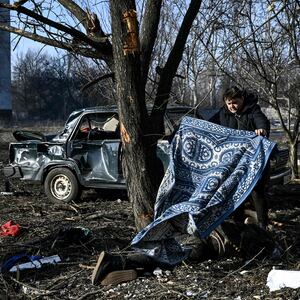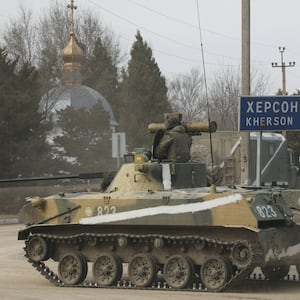Ukrainian officials are warning that Russian forces may now have control over Chernobyl, the site of the world’s worst nuclear disaster, raising alarming questions about possible radiation issues descending upon Ukraine, Belarus, and other European countries should the fighting continue.
Ukrainian Prime Minister Denys Shmyhal and Mikhail Podolyak, a top presidential aide, said that Ukrainian forces had lost the site after clashing with Russian troops there, although that could not be independently confirmed by The Daily Beast.
“After a vicious battle we lost control over the Chernobyl plant. The condition of facilities at the former nuclear plant, the confinement and nuclear waste storage is not known,” said Podolyak in comments to UNIAN.
“After the absolutely senseless attack by the Russians in this area, it’s impossible to say if the nuclear plant is safe. This is one of the most serious threats to Europe today. Knowing the habits of Russians, they are probably already preparing provocative things at the power plant. Or using damage done to the facilities during the attack to blame Ukraine, or they themselves will damage this incredibly dangerous facility.”
Shortly afterward, Ukrainian Prime Minister Shmyal also confirmed that “all Chernobyl facilities” were now controlled by Russian troops in a statement to Ukrainian media agency Hromadske.
The forces entering Chernobyl have come from Belarus. Their assault on the sensitive nuclear plant raises huge concerns of radiation dust, Anton Gerashchenko, an adviser to Ukraine’s Interior Ministry, said in a post on Facebook.
“Russian occupation forces are trying to seize” the Chernobyl Nuclear Power Plant, Ukrainian President Volodymyr Zelensky had announced earlier on Thursday. “Our defenders are giving their lives so that the tragedy of 1986 will not be repeated.”
The news comes hours after Russia began its invasion of Ukraine in the early hours of dawn Thursday, rolling explosions through Kyiv, Kharkiv, and many other cities. Zelensky declared martial law, urging citizens to stay home. President Joe Biden has said he will announce additional sanctions Thursday against Russia to mete out punishment for the assault on Ukraine that were once meant to prevent the invasion from happening altogether.
Zelensky said the development in Chernobyl was particularly alarming because it shows the nature of the conflict and shows just how brazen and reckless Russia will be, as the ramifications of fighting in Chernobyl could quickly expand the conflict and its consequences through Europe.
“This is a declaration of war against the whole of Europe,” Zelensky said.
Russia moved its forces into Belarus, to the north of Ukraine, in recent weeks under the guise of running military drills, but U.S. officials warned in a recent call with reporters the move could be used to cover up invasion plans.
The shortest route Russia could take to reach Kyiv in Ukraine is from the north, and that reality has now inevitably brought forces to the region surrounding the Chernobyl nuclear power plant, where the 1986 nuclear accident occurred, releasing far more radioactive material than the atomic bomb dropped on Hiroshima, according to the International Atomic Energy Agency.
Radioactive particles that are in the soil or under the containment structure there are slowly decaying and might not be a major threat—but that’s only if soldiers leave the area relatively quickly, according to The New York Times. And some zones emit radiation “thousands of times higher than normal,” the Times reported.
The IAEA adopted a decision in 2009 that “any armed attack on and threat against nuclear facilities devoted to peaceful purposes constitutes a violation of the principles of the United Nations Charter, international law and the Statute of the Agency.”
The IAEA said in a statement shared with The Daily Beast it is “closely monitoring developments in Ukraine,” including the “security of its nuclear power plants and other nuclear-related facilities.” Ukraine reached out to the IAEA to inform the agency armed forces had taken control of the power plant, the IAEA said.
"[I]t is of vital importance that the safe and secure operations of the nuclear facilities in that zone should not be affected or disrupted in any way,” IAEA Director General Rafael Grossi said.
Authorities have attempted to isolate the cascading effects of the initial disaster by establishing and expanding the exclusion zone over the years, a zone meant to prevent people from being exposed to radioactive particles. The United States and dozens of other countries have contributed funding to the $1.7 billion stainless steel arch over the reactor in recent years.
Additional reporting by Allison Quinn.







